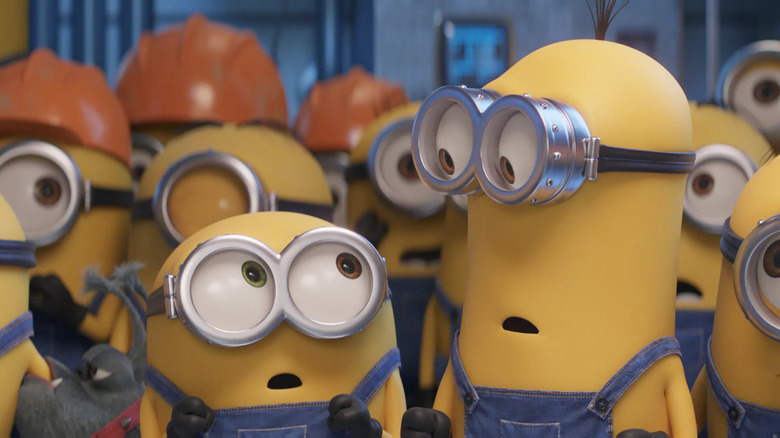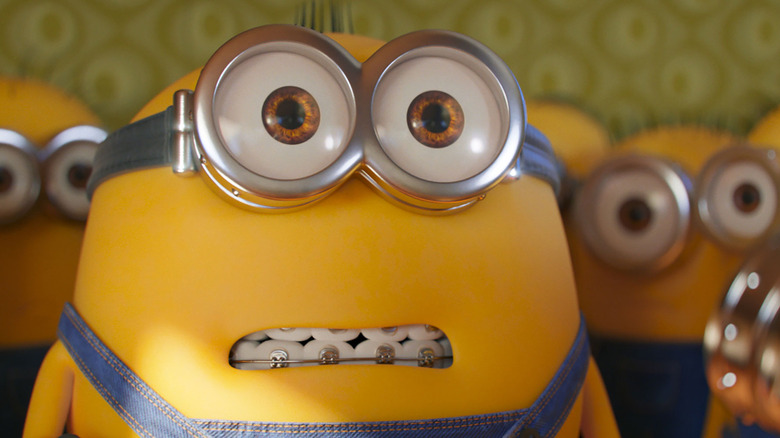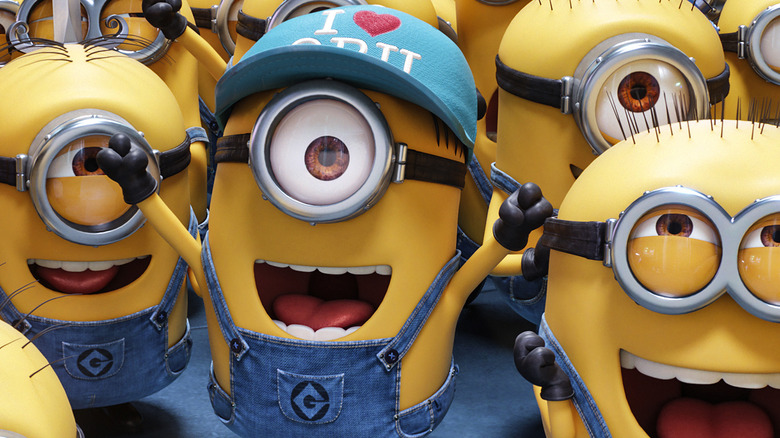What The Minionese In The Minions Movies Means
Under the right light, the Minions — the Twinkie-shaped, banana-obsessed mutant hench-critters of all the supervillains in the "Despicable Me" universe — are a kid's first taste of punk rock. While they hardly seem daring or edgy, often emblazoning popsicle packages and IHOP menu items, one must recall that they serve an innate biological imperative to ensure evil persists in the world. The Minions are not heroic or helpful. They are not noble or virtuous. They are, by their evolutionary design, agents of chaos. Their longing for mayhem and entropy is only undercut by their simple physical inability to cause destruction on a mass scale. The Minions are cheery, walking middle fingers to all that is decent in the world.
"Minions: The Rise of Gru" will be the fifth feature film to feature the Minions (in addition to 15 short films), and their reality is largely well-known to the general public by now. The Minions have yellow skin, wear goggles and overalls, have scant hair, and either one or two eyes. They have common Briton or Irish-rooted, traditionally male names like Kevin, Stuart, and Robert. Most notably, they speak in a gibberish-like language that incorporates inflections from English, Italian, and French; one might hear them clearly say "banana," "papaya," or "Papagena," a character from Mozart's "The Magic Flute."
That language, however, is not just voice actor (and Minions creator/usual director) Pierre Coffin improvising. As it turns out, Minionese is something of a conlang with unwritten rules all its own.
Minion vocabulary
Attentive Minions fans — could the fans also be called "Minions?" Hm. — will likely have noted that Minionese has recurring vocabulary words (handily compiled on fan websites) used throughout the films. Mental Floss pointed out that the Minion language is constructed not of singular letter sounds, but entire vowel-consonant syllables (similar to the way Japanese operates). Their language is also pliable, affecting cognates from English, often incorporating a certain kind of "babyish" babble. Poo-pye, Bello, etc. Occasionally, their language will also recontextualize onomatopoeia as nouns. Woof-woof is "dog," for instance.
Since a lot of Minionese is derived from English, it appears to be uninflected; there are no singular words for various verb conjugations ("I love, you love" as opposed to "amo, amas"), nor are nouns presented with unique grammatical cases. There are no nominative, accusative, genitive cases, etc. These rules seem to change, however, when other languages begin to sneak their way into Minion lexicon. Italian, for instance (a heavily inflected Romance language) crops up from time to time: "Me le due, spetta" is Minion for "io lo faccio, spetta," or "Wait, I'll do it."
Coffin admits, however, that a lot of his writing for the Minion language is just as much a jumble as his own writing process; If there's an Italian restaurant take-out menu in the room with him while he's writing, then Italian will inevitably work its way into the script. It's not as carefully constructed as, say, Klingon, which has syntax, structure, and a whole vocabulary one can learn on Duolingo.
It's not chaos
But Minionese is not a free-for-all babble like some fictional alien languages. According to the reliable Wookieepedia, the Ewok language heard in Richard Marquand's "Return of the Jedi" was invented by playing audio clips of the Kalmyk language (spoken by the Kalmyk people in Mongolia) to English-speaking actors, then asking them to improvise a language based on those sounds. There is no vocabulary or structure to Ewok, and humans cannot learn how to speak it.
Minionese takes a few steps away from Ewok but doesn't go quite as far as Klingon or Dothraki. Instead, its clever amalgam of various languages, tossed together into an aural salad of international sounds instantly makes it recognizable all over the globe. Indeed, as the Mental Floss article pointed out, some locally common phrases have worked their way into Minionese. When Minions toast, they say "kompai," which is Japanese. When they say thank you, they say "terima kasih," which is Indonesian.
This international language not only allows Minions to be kind of understood by anyone but also has a canonical explanation. In "Minions," it's explained that the creatures emerged from the oceans millions of years ago and are essentially immortal. Minions have lived for eons, around in a microscopic form about 3.7 billion years ago when life first appeared on Earth. Throughout their lives, they have traveled all over the world, looking for evil masters to serve. In that time, their language would eventually become a patchwork of hundreds of other languages, slightly familiar to every ear. That's weirdly genius.
"Minions: The Rise of Gru" opens in theaters on July 1, 2022.


